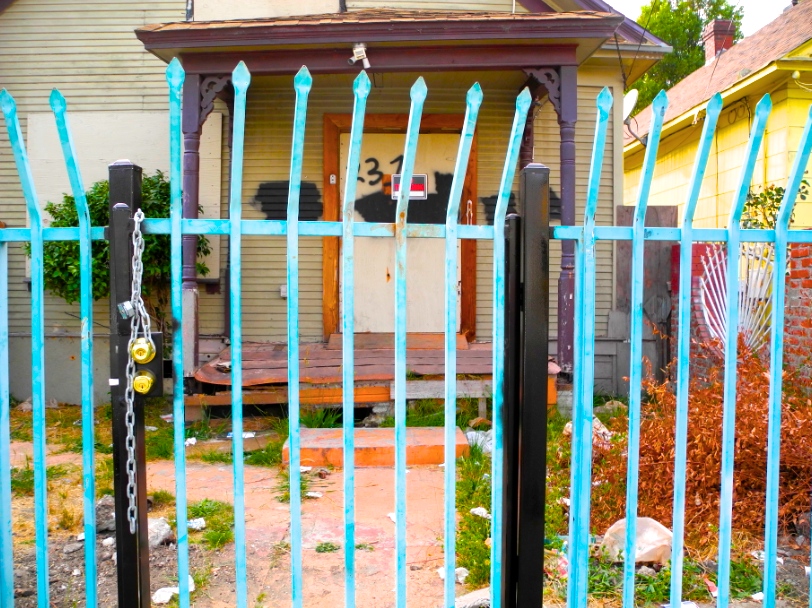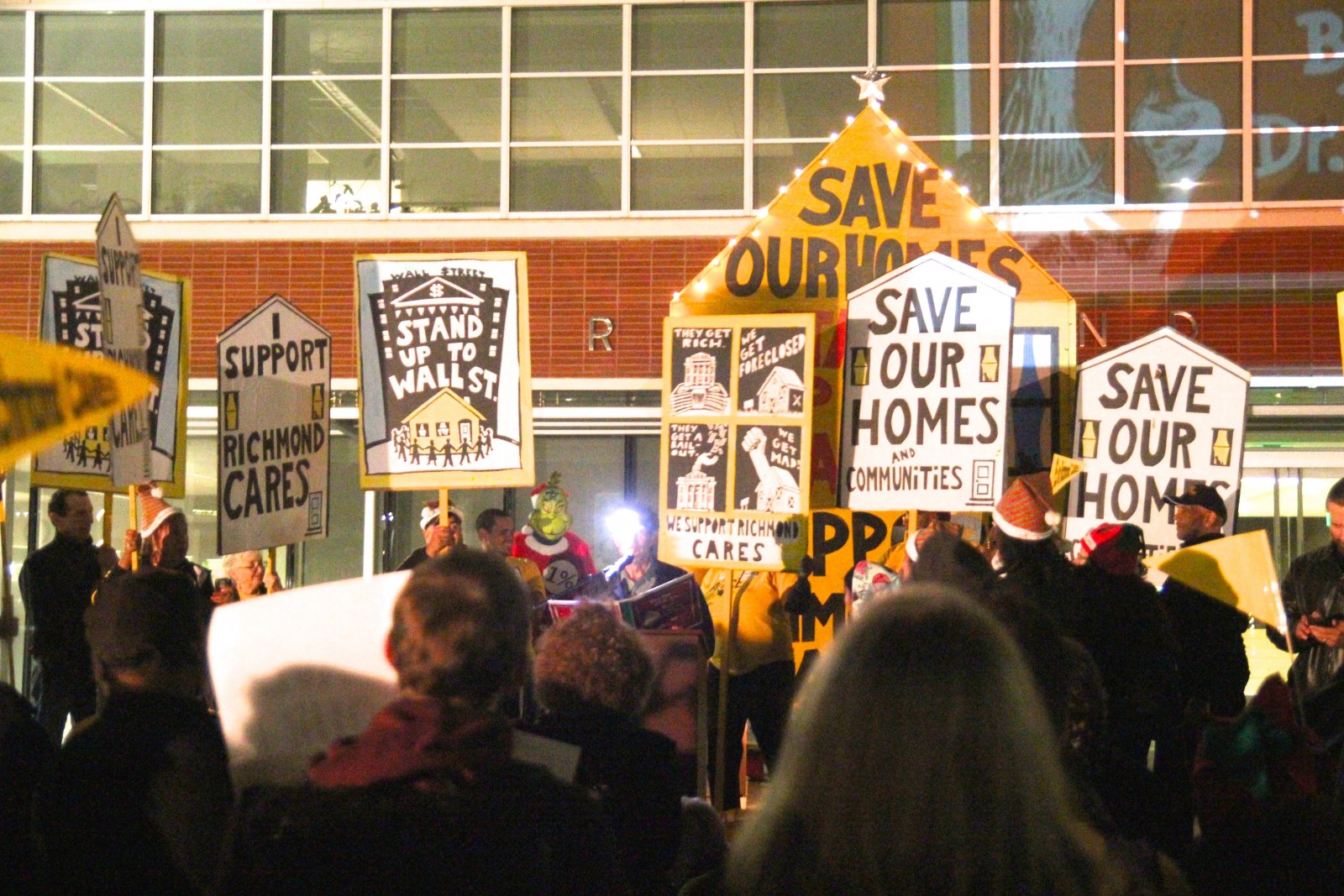
RICHMOND, Calif.— Once this city uses eminent domain to seize and refinance underwater homes belonging to Wall Street banks, towns nationwide will hurry to replicate the success. And when they do, they’ll study the maverick trio of power holders who made it happen here first.
A hint: the foreclosure prevention program known as Richmond CARES, or Community Action to Restore Equity and Stability, is a winner not only because grassroots organizers, government advocates and financial investors have all coincided in a perfect storm — but because Constitutional law is on their side, and the plan isn’t costing taxpayers a dime.
Seven years into the international foreclosure crisis provoked by Wall Street’s loan profiteering and mortgage bundling crimes, the moral and legal arguments for rescuing America’s cheated homeowners remain strong. The Richmond proposal also makes rational economic sense: by allowing new investors to repurchase and write down underwater mortgages, banks and lenders can clear their books of toxic loans while homeowners and cities stay afloat.
But until recently, apart from vocal eviction defense efforts in cities like Atlanta and Minneapolis, the public pressure to reclaim homes from fraudulent banks has been muted. Still today, 20 percent of homeowners nationwide, or as many as 10 million homes, remain underwater – meaning the owners owe more on their mortgages than the devaluated homes are worth.
And in Richmond — a city of 106,000 made up predominantly of people of color, with 40% Latino, 26% African American, 18% white and 12% Asian — the crisis is even more acute. Half the city’s homeowners remain drowning in mortgage debt. And while it didn’t suffer bankruptcy like its East Bay neighbors Stockton and Vallejo, Richmond was battered in the crisis: house prices here plummeted 60% since 2007, homeowners lost $24 million in 2012 alone, and the city suffered a thousand additional foreclosures last year.
Mayor Gayle McLaughlin, who is the face of Richmond’s fight to keep residents in their homes, says each foreclosure impacts the value of nine homes around it and costs the city tens of thousands of dollars in fees. Meanwhile, real estate prices drop, blight and crime increase, and the economy sinks as people cut back spending on basic needs in order to pay bloated mortgages.
The city didn’t want to have to use eminent domain, says McLaughlin, who last year marched with community organizations to the city's head branch of Wells Fargo to ask if the bank would voluntarily renegotiate underwater loans at fair market value, known as principal reduction.
But bank officials refused to meet with them; Wells Fargo and other financial institutions continue to play what McLaughlin calls an obstructionist role, standing in the way of vital reforms. “We asked them, ‘What is your solution to fix the problem?’ and they had none,” McLaughlin says, so “we’re stepping in to right a wrong and to prevent further devastation. We can’t just let Wall Street trample on us and our communities — we have to stand up.”
Perhaps the highest profile case to date involving eminent domain in California occurred right here in the East Bay, in 1982, when the California Supreme Court approved Oakland’s plan to seize the Raiders football team. Now, as Richmond prepares to seize 624 homes languishing in high default-risk Private Label Security, or PLS, loans — the ones that were famously chopped up, turned into bonds and sold in bundled packages to investors everywhere, creating “zombie” mortgages that can't be refinanced because no one actually owns the title — the showdown presents a crucial test.
In Richmond versus Wall Street, the court winner may determine the future direction of foreclosure battles across America as the country teeters toward a second and perhaps much greater financial crash. The big banks know this isn’t about 624 underwater homes: if Richmond succeeds, its victory over the banking, home lending, financial services and real estate industries would redraw the mortgage map in America as we know it.
The Richmond Players
So who, specifically, propelled this movement to keep Richmond residents in their homes? The first and biggest drivers were grassroots organizations like the Alliance of Californians for Community Empowerment (ACCE) and Home Defenders League, which galvanized community members in tandem with the Richmond Progressive Alliance and SEIU Local 1021, mobilizing residents through meetings, rallies and local events to demand foreclosure solutions.
The second factor was the strength and persistence of Mayor McLaughlin herself, who at 61 is using the last months of her second and final term in office to defy the same Wall Street banks whose reckless mortgage lending practices provoked the foreclosure crisis from which they profited. “We keep getting this hemorrhaging from the foreclosures,” says McLaughlin, who accepted zero corporate funding to become America’s first Green Party mayor of a city this size. “There are some things in life that you have to fight with all the power you can muster – that’s what brought me here.”
The third, pivotal ally is the San Francisco-based private investment firm Mortgage Resolution Partners (MRP) whose institutional clout — it has close ties to Wall Street and powerbrokers in Washington — made the big banks sit up. With a lineup of investors ready to go, MRP’s goal is straightforward. For a home that was bought, say, for $400,000 with a $300,000 mortgage seven years ago, and which is worth only $200,000 today, MRP will find a buyer to sell the mortgage to at fair market value, say $160,000.
This enables the homeowner to refinance the mortgage, say, for $190,000, creating a win for the investors, homeowners and the city. As banks clear their books of the zombie mortgages, MRP collects a fee of $4,500 for every mortgage it helps refinance — making it a game-changer for everyone involved.
“Wells Fargo is not going to buckle to a small grassroots movement,” says Steven Gluckstern, MRP’s co-founder and executive chairman, but “on the other hand, if someone shows up with money and government power, that’s a whole other story.” Gluckstern, who worked with Warren Buffet and oversaw hundreds of billions of dollars during his tenure at Zurich Financial Services, served on President Barack Obama’s original finance committee and was founding chairman of the progressive donor group Democracy Alliance.
Like McLaughlin, Gluckstern expects the banks to sue once the eminent domain resolution is pushed to court — but he is confident of success, which is why MRP is prepared to pay all legal fees keeping Richmond cost-free. “We will win because it is legal,” he says. “The reason [the banks] fight so hard is because they know we will win on the merits. We’ll take it all the way to the Supreme Court if need be.”
“If it succeeds in Richmond, it will succeed everywhere,” adds Gluckstern. “They’ll waste a lot of time and energy and be no better off than if they cut a deal for themselves.”
Wall Street Attacks
But so far, the big banks, mortgage lenders, realtor groups — and even the federal government — aren’t seeing it that way, and their resistance has been fierce. The finance industry has shot back against Richmond’s plan, claiming that the use of eminent domain to seize mortgages is illegal and that it would crash housing markets, impose massive credit restrictions and shut off mortgage financing to future borrowers altogether.
To McLaughlin and homeowner advocates, the industry's threat is a classic case of Wall Street doing what it does best: peddling fear and doomsday scare tactics, the way it did during the 2009 bailouts, while holding a gun to the public’s head.
Last August, Wells Fargo and Deutsche Bank sued Richmond on behalf of their clients, BlackRock and PIMCO — the world’s largest money manager and America’s biggest holder of mortgage-backed securities, respectively — calling the city’s move unconstitutional. But U.S. District Court Judge Charles Breyer dismissed that lawsuit in September, saying it was premature and based on “future events that may never occur.”
A second lawsuit by the banks was later thrown out as well. “I was in the courtroom,” says McLaughlin, “and the judge made it very clear that he thought it was just outrageous they would be trying to sue Richmond, so he threw it out of court.”
In November, 10 democrats in Congress wrote a letter to the U.S. Department of Housing and Urban Development, and to the Federal Housing Finance Agency (FHFA) — which had instructed national lenders Fannie Mae and Freddie Mac to withdraw all loans from cities that pursue eminent domain — pronouncing support for the cities and claiming that any federal policy to restrict mortgage lending would violate anti-discrimination laws.
Then, in December, the ACLU of Northern California filed a Freedom of Information Act lawsuit against the FHFA, seeking to shed light on illegal ties between the financial industry and high-level government officials. The FHFA declined to comment on the lawsuit for this article.
Meanwhile, the fear mongering continues. David Stevens, CEO of the Mortgage Bankers Association, told The New Yorker that Richmond's use of eminent domain would “place a scarlet letter on every home in the community.” The Securities Industry and Financial Markets Association, or SIFMA, along with heavy hitters like the American Bankers Association, Financial Services Roundtable and a raft of industry and lobby groups, bristles at the prospect that Richmond could be setting a precedent.
“Once you cross that barrier and you put investors on notice [that] any home in Richmond is now subject to eminent domain, they will price that risk accordingly — and if there’s more risk, there’s going to be more cost,” Dustin Hobbs of the California Mortgage Bankers Association told Occupy.com. “You start to price people out of the market immediately. And another concern is that if it started in one place, it would spread.”
Challenges Ahead
That is exactly what is happening. From Irvington and Newark in New Jersey, to Yonkers (NY), Baltimore, Chicago and cities in Pennsylvania, Minnesota, Florida and Michigan, officials are closely watching the developments in Richmond as they weigh similar resolutions. In the West, proposals to seize homes through eminent domain have drawn official support in Seattle, North Las Vegas and cities up and down California — from El Monte, Baldwin Park, Pomona and San Bernardino in the south, to Salinas, San Pablo, San Francisco, Vallejo and Oakland.
But there are still hurdles. To file a resolution of necessity using eminent domain requires a supermajority on the city council — and so far only four, not five, of Richmond’s seven council members endorse the plan. This means that Richmond must find a partner city that supports its efforts by forming a Joint Powers Authority, which will put the process in motion. That is the stage where McLaughlin and her city currently stand: seeking an ally city, any city, to push the plan forward.
Once Richmond declares eminent domain and begins to seize mortgages, the banks are expected to sue. But, “if they’re going to resist this all the way, then the court will determine, and we believe we have the sound legal argument to win,” says McLaughlin.
“They’re trying to portray it like there’s a great risk for the city’s finances to be harmed, its bond ratings, its mortgages that won’t be made available. But there’s a greater risk to let the scenario continue as it is,” she adds. “We want Richmond to be an example to other cities.”
In the David and Goliath tale of Richmond vs. Wall Street, the tide may be turning sooner than people think.
3 WAYS TO SHOW YOUR SUPPORT
- Log in to post comments
















